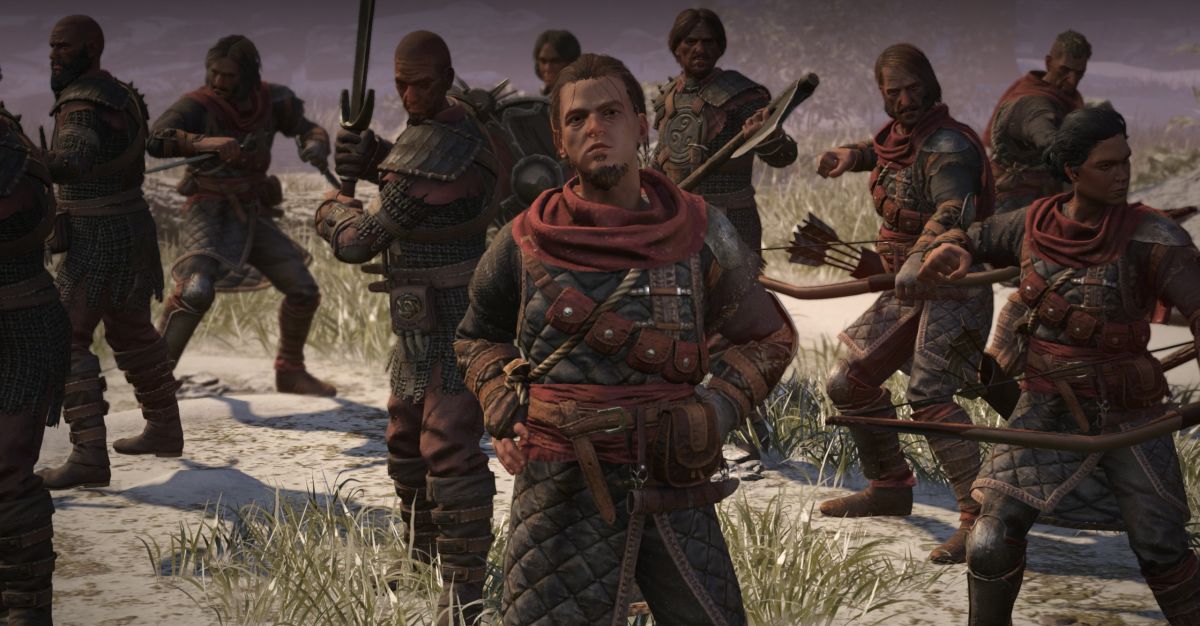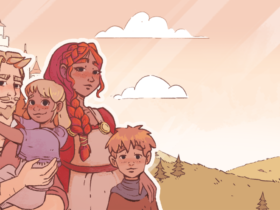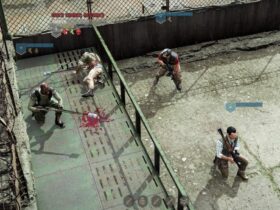war stories review
🖥️
need to know
what is it? Detailed player-driven RPG with tactical turn-based combat
release date: April 12, 2023
Expect to pay: £30/$35
Developer: Shiro game
Publisher: Unlimited Shiro
commented on: AMD Ryzen 5 3600, Nvidia GeForce 2080 Super, 32GB RAM
Steam deck: playable
Association: Official Website(opens in a new tab)
Like a battle-hardened mercenary thrown into yet another silly adventure, Wartales hides his colorful inner life behind a grim, mysterious facade. This player-driven role-playing game presents a subdued aesthetic that lacks a typical central storyline and isn’t defined by any single characteristic. It’s a game that rejects your initial advances with a grunt, knowing you’ll be feeding the crows before the week’s up.
Survive long enough to pierce the gritty exterior, however, and you’ll find a game built from a thousand little ideas. Over time, these thoughts accumulate into a journey that is unique to you. It’s not as weird as Kenshi, or as engaging as Mount & Blade, but it makes up for it in the level of personal attachment you have to the party you create.
(Image credit: Shiro Games)
Wartales puts you in charge of a newly formed mercenary company in a low-fantasy realm ravaged by conflict. Your goal is simply to look after the band’s interests, increasing the power and prestige of your group by taking advantage of the turmoil in the kingdom. how How you do this is largely up to you. You choose where to go, who to recruit, how to make money and where to camp at night.
daily bloodletting
In fact, the decision-making process begins before the game begins, as Wartales allows you to play in a variety of ways. The game’s turn-based combat and survival simulation has two separate difficulty settings, which let you decide how often you want to save your progress. The choice that will most determine your experience, however, is whether to play level scaling, where the game tries to match its challenge to your abilities, or keep the level area locked, increasing the difficulty as you push toward the edge of the world.
In my opinion, region locking is the way to go because it gives you a clearer picture of where you are on the power curve and encourages you to explore every region you visit. No matter how you customize your experience, Wartales still operates on the same two levels. The top tier is a Mount & Blade style world where you can travel between locations, visiting villages, farmsteads, ruined fortifications and many other landmarks. Your journey across the map is limited by stamina meters. When it runs out, you need to rest, or your companions will start to burn out.
(Image credit: Shiro Games)
If you want, you can just collapse by the campfire and wait until your stamina meter refills. But your companions won’t be too happy about it. They expect to get food at every stop and pay a service charge every third stop. The more companions you have in camp, the more food and money you’ll need to distribute during these time intervals.
Inevitably, the path you choose will lead to a battle.
In short, cakes and coins are two key resources you need to continue your adventure. How you get these is up to you. The most straightforward way is to go to the nearest inn and get some contracts from the bounty board. These pay small amounts of coins for the heavy lifting of killing local bandits or delivering messages to other villages. Alternatively, you can hunt animals in Wartales’ many forests, keeping the meat for food and selling the pelts for cash. Or, you might lead a life of crime, stealing food from market vendors under their noses and robbing other travelers who roam the map.
Although your route through the world is open-ended, certain experiences are universal. Inevitably, the path you choose will lead to a battle. When the blade is drawn in Wartales, the game switches to a turn-based battle map. Like the game as a whole, the combat seems unremarkable at first, but it reveals an impressive openness in the end. Before the battle begins, you can deploy your troops on the field, choose which ones to attack first, and use the rest in any order you like. You can also deploy movement points, basic attacks, and special abilities in any combination, and keep mixing and matching until you run out.
(Image credit: Shiro Games)
This flexibility extends to how your units fight. A character’s fighting style is influenced by a variety of factors, such as their base class, the skills they unlock, and even the specific weapons they equip. You can even choose how your units regain the Valor Points used to deploy special abilities. They may regain these by killing enemies, engaging them (i.e. getting into combat so they can’t retreat without risking damage), or standing next to friendly or enemy units at the end of their turn.
Despite this flexibility, combat is anything but easy. Your units can only take a few hits before risking death, and the team’s Valor points are pooled together, so you’ll need to think carefully about when to use them. A basic tactic is to engage the enemy with a unit with good defensive skills, then use a high DPS unit to ambush them from behind, doing extra damage. But after a few hours of playing, my best ranger (and the team’s leader) unlocked an ability that releases smoke, which allows any friendly units in the area to attack their engaged opponents for free. My main strategy for the next few hours was to try and engage hordes of enemies, then use Heldt’s smoke ability to slice away the extra health from as many of them as possible.
part-timer
Your combat methods will evolve as units become more proficient and new strategic avenues open up. But your mercenaries aren’t defined solely by their combat skills. Each character in the crew can choose to help the camp’s second career in some way. For example, anglers can fish from set points around the map, increasing their food supply for free. At the same time, chefs can turn these fish into more nutritious meals, further increasing your ration. Blacksmiths can forge new weapons and armor for your troops, while thieves can steal goods from under the noses of merchants and pick locks on chests in abandoned ruins for extra loot.
(Image credit: Shiro Games)
Through this combination of combat and character classes, your mercenaries will start to develop more specific personalities. My starting archer, named Rydrick, is an absolute liability on the battlefield. Not only does he seldom engage in combat, but when his hands are dirty, his arrows tend to hit companions rather than foes. On the other hand, he’s also the head tinkerer at the camp, responsible for making the basics that keep the camp running. That makes enduring the occasional arrow in the ass worth it.
You can capture and tame wild animals to fight alongside you, each with its own skill tree.
As your camp and mercenaries grow, new opportunities arise. You can capture and tame wild animals to fight alongside you, each with its own skill tree. You can knock down and handcuff enemies on the battlefield, and exchange them for a fee at the nearest prison. Hidden around the world are elaborate tombs that you can explore, using torches to pierce the darkness to find hidden treasures and strange artifacts that you’ll need to recruit a scholar to decipher. While there’s no central storyline to follow, each district has an optional story you can follow that will ultimately shape the future of its inhabitants.
I’ve spent a lot of this review explaining how Wartales works. But how it works is also its plus point. Shiro Games has created a rich and detailed mechanical toybox where each action you perform moves the needle slightly, creating a reaction or reward that gives you an idea of what to do next. The story it tells isn’t as generative as your Dwarfhold or Rim worlds, but the way its rules work makes it easy for your imagination to fill in the narrative gaps. As you wander the camp, your mercenaries will occasionally introspect to make a secondary narrative choice. In one instance, Rydrick decided to socialize more with the other mercenaries, presumably to improve his standing among them. His efforts really made him a friend in camp. Unfortunately, that’s the pony.
(Image credit: Shiro Games)
Wartales’ battered chain mail has gaps. The structure of the game requires a lot of backtracking, especially in the early stages. You’ll often need to return to the village to submit contracts, buy food and other equipment, or sell items to lighten your inventory. It is also possible to fall into a cycle of only making enough money to cover basic costs, making it difficult to expand further into new areas. While I wouldn’t describe Wartales as a tedious game, it moves frustratingly slowly at times.
More broadly, the world itself is not particularly distinctive compared to divinity. Once you’ve explored a few areas, the build format for those areas gets poked out, taking away some of the magic. While the quests and dialogue are well written, it’s hard for me to tell you the names of any characters I’ve interacted with outside of my own party.
That said, the mercenaries you recruit, train, eat, sleep with, explore with, and fight with will always be etched in your mind. Wartales may not be the flashiest or easiest game to pick up, but persistence will earn you the most valuable currency any game can offer: Memories.
Check more articles in our categories Gaming & News & Anime.
Thanks for visiting we hope our article war stories review
, help us and share the article on Facebook, instagram and e-mail with the hashtags ☑️ #war #stories #review ☑️!














Leave a Review